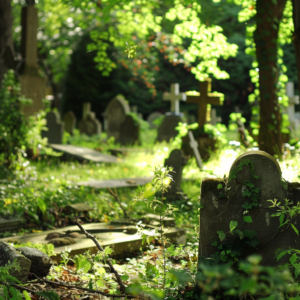Introduction to Eco-Friendly Funeral Practices
The concept of eco-friendly funeral practices has been gaining attention in Miami as residents become increasingly aware of environmental issues and seek sustainable options in all aspects of life. The significance of these practices is rooted in their potential to minimize the environmental impact that traditional burial methods often entail. Eco-friendly funeral practices offer an alternative that supports environmental conservation while honoring the memory of the departed.
The Need for Sustainable Funeral Alternatives
In the traditional funeral industry, practices such as embalming, the use of metal caskets, and concrete burial vaults are standard. These methods, while conventional, are not environmentally friendly due to the use of hazardous chemicals, non-biodegradable materials, and land use concerns. As Miami’s population continues to exhibit a strong commitment to protecting the fragile ecosystems around them, sustainable funeral alternatives present a way to align end-of-life ceremonies with these values.
By choosing eco-friendly funeral options, individuals can make a significant contribution to preserving the local environment. These methods can reduce the carbon footprint, conserve natural resources, and protect the region’s diverse ecosystems from potential contamination.
Understanding Eco-Friendly Funeral Options
Eco-friendly funerals encompass a variety of practices that reduce environmental impact. Green burials, for example, omit the use of toxic embalming fluids and opt for biodegradable caskets or shrouds instead of metal or treated wood caskets. Such burials may take place in a natural setting, contributing to land preservation and offering a serene resting place harmonized with nature.
Another alternative is water cremation, also known as alkaline hydrolysis, which utilizes water and potassium hydroxide to accelerate the natural decomposition process. This method produces less carbon dioxide compared to traditional cremation and results in a substance that can be safely returned to the earth.
Additionally, Miami’s residents have the option to choose living memorials, where a tree or coral reef is planted in memory of the deceased. This option not only serves as a tribute but also provides benefits to the local environment through reforestation and marine conservation efforts.
Educational Initiatives and Accessibility
Educating the public about these alternatives is crucial for their adoption. Many people in Miami may be unaware of the range of eco-friendly funeral practices available to them. There are initiatives provided by local funeral homes, environmental groups, and community organizations aimed at increasing awareness through workshops, discussions, and the dissemination of informative materials.
Accessibility is also an important factor in the discussion on sustainable funerals. Some eco-friendly options may be more affordable than traditional practices, potentially making them an economical choice for many families. By providing clear information about the costs and benefits, funeral service providers can help Miami residents make informed decisions that align with their environmental values and their financial considerations.
Legislation and Industry Standards
The emergence of eco-friendly funeral practices has spurred changes in legislation and industry standards. In Miami and throughout Florida, regulations that allow and recognize green burials are crucial for facilitating these practices. The funeral industry is also evolving, with professionals increasingly acquiring the knowledge to support families in making green choices.
Standardization of eco-friendly practices is important for ensuring that green claims are backed by genuine environmentally sound actions. Certifications such as the Green Burial Council’s accreditation for funeral homes help guarantee that providers are meeting specific environmental criteria.
Community Engagement and Support Systems
Community engagement plays a vital role in advancing eco-friendly funeral practices. Miami’s diverse community has the potential to foster support systems that encourage sustainable end-of-life choices. Social support for bereaved families can aid in easing the transition to non-traditional funeral methods, which may be less familiar to many.
Fostering a support system involves creating networks among environmentally conscious individuals, faith groups, and community leaders. Collective efforts can lead to a culture shift that embraces eco-friendly funeral practices as a new standard.
Conclusion
As Miami continues to embrace sustainability in various aspects of life, eco-friendly funeral practices are becoming a meaningful part of the conversation about environmental responsibility. The growth of education and awareness on this topic offers Miami residents the opportunity to choose end-of-life ceremonies that demonstrate their commitment to preserving the natural beauty and health of the region for future generations. By exploring and supporting sustainable funeral options, the community can make a significant impact on reducing the environmental imprint of burial practices while honoring those who have passed in a thoughtful, harmonious manner.
Importantly, the shift towards eco-friendly funerals is facilitated by informed choices and community engagement. Miami’s dedication to environmental stewardship is reflected in the rising interest in and adoption of practices that benefit the planet. The city’s example may inspire broader changes across the industry and society as a whole—leading the way in recognizing the importance of every individual’s ecological legacy.

What are eco-friendly funeral practices?
Eco-friendly funeral practices are methods of laying one’s remains to rest in a way that has minimal environmental impact. This includes biodegradable caskets, natural burial grounds without embalming processes, cremation alternatives such as bio-cremation, and using sustainable materials throughout all aspects of the funeral service.
How does natural burial contribute to environmental conservation?
Natural burials contribute to environmental conservation by forgoing the use of chemical embalming fluids, which can leach into the soil, and utilizing biodegradable burial containers that decompose naturally. This process allows the body to return to the earth organically, enriching the soil without negative impacts, and often supports the growth of native flora and fauna.
Are eco-friendly funeral options more cost-effective than traditional methods?
Eco-friendly funeral options can be more cost-effective than traditional methods. The absence of costly services such as embalming, expensive caskets, and vaults, along with simpler services, can significantly reduce the overall expense. However, prices can vary based on the provider and the specific products and services chosen by the family or outlined in the deceased’s final wishes.

0 Comments